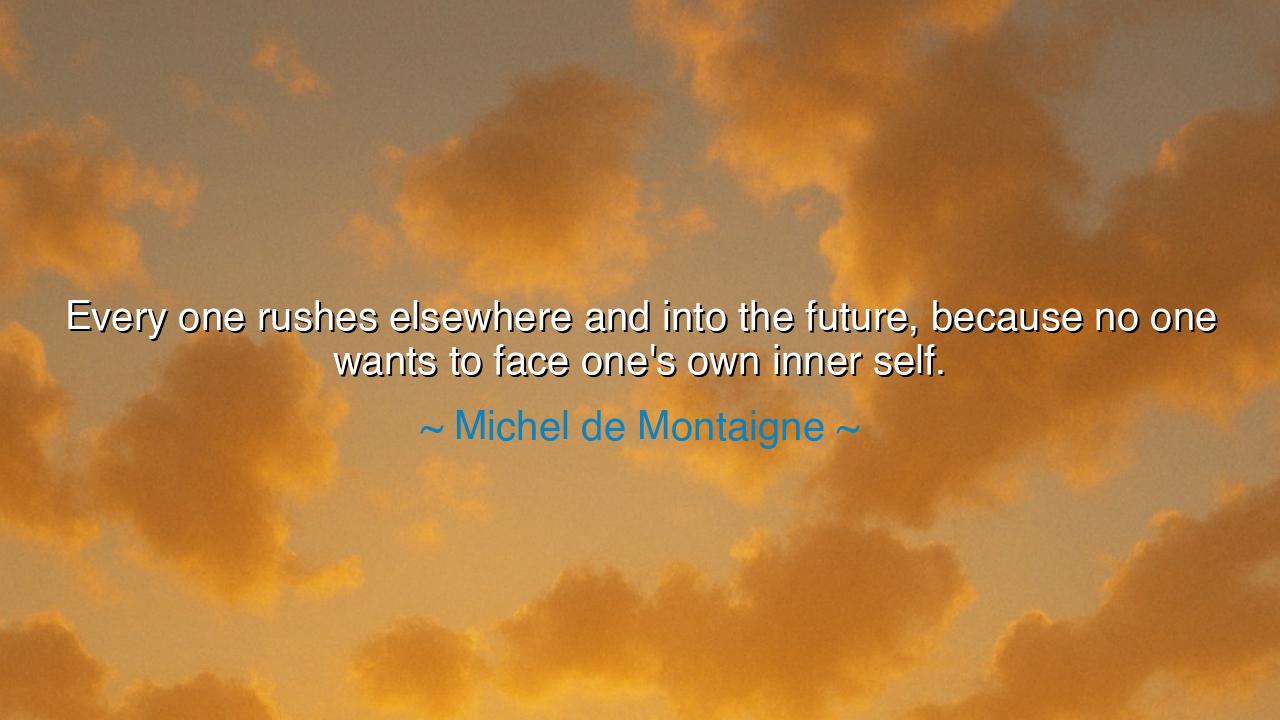
Every one rushes elsewhere and into the future, because no one
Every one rushes elsewhere and into the future, because no one wants to face one's own inner self.






"Every one rushes elsewhere and into the future, because no one wants to face one's own inner self." These words of Michel de Montaigne, the great French philosopher, strike at the heart of the human condition. In his wisdom, Montaigne observed how mankind, in its restlessness, turns away from self-reflection and inner truth. The quote speaks of a deep fear—the fear of confronting the self, the true and often uncomfortable reality of one’s own soul. We rush into the future, ever searching for something beyond ourselves, avoiding the one place where true understanding lies: within.
In every age, the human spirit has sought to avoid the silent counsel of solitude. The noisy distractions of the world beckon us—be it in the form of ambition, material success, or the clamor of a world that promises fulfillment at the end of some distant road. Yet, when one reaches the pinnacle of these external pursuits, what remains is often a hollow echo. True contentment, Montaigne suggests, is not found in rushing forward but in facing the turmoil that churns within, confronting those quiet moments of introspection that we dread.
Let us turn to the story of Alexander the Great, one of the most ambitious and celebrated figures of history. His conquests spanned across continents, and yet, he was never satisfied. The very moment he reached the farthest point known to his time, India, he hesitated. What was left? There was no more land to conquer, no greater challenge on the horizon. And yet, he turned his eyes toward home, longing for peace. Alexander, in his final years, was confronted with the emptiness that comes from chasing the future relentlessly, only to discover that the soul's true battle was within. His regrets were not for the battles he fought, but for the time he did not spend with himself.
Montaigne’s words echo this ancient truth: We avoid facing our inner self because it demands much. To confront the self requires shedding illusions, facing our weaknesses, our fears, and our failings. It is easier to keep moving, to push the discomfort of self-examination to the corners of our minds. Yet, this is the path of illusion, for without self-awareness, we are doomed to repeat the same cycles, forever unsatisfied, forever chasing.
Consider the ancient Stoics, like Marcus Aurelius and Seneca, who taught the discipline of inner calm amidst external chaos. They understood that only through self-awareness could one find true peace. In their daily practices of reflection and self-control, they confronted their flaws and weaknesses with bravery, not avoidance. Their wisdom came not from the external victories of empire or riches, but from the internal peace they cultivated by facing the truth within. In stillness, they found the clarity to navigate the storms of the world.
The lesson for us, then, is clear. Self-reflection is not a luxury but a necessity for true growth. We must seek not only to conquer the external world but to master the world within. In every quiet moment, when the distractions fall away, we are faced with a choice: Will we face the depths of our souls or continue rushing forward, forever distracted, forever searching? The answer lies in the courage to confront the self, to be still and listen.
Let us resolve, then, to slow down and turn inward. Take moments each day to reflect. Begin with simple questions: What is truly important to me? What am I avoiding? Through this discipline, we begin to hear the quiet whispers of wisdom that have always been there, waiting to guide us. Just as Montaigne did, we can embark on the most rewarding journey—the journey of self-knowledge. Only then, when we are at peace with ourselves, can we face the future, not with fear, but with clear purpose and true understanding.






AAdministratorAdministrator
Welcome, honored guests. Please leave a comment, we will respond soon